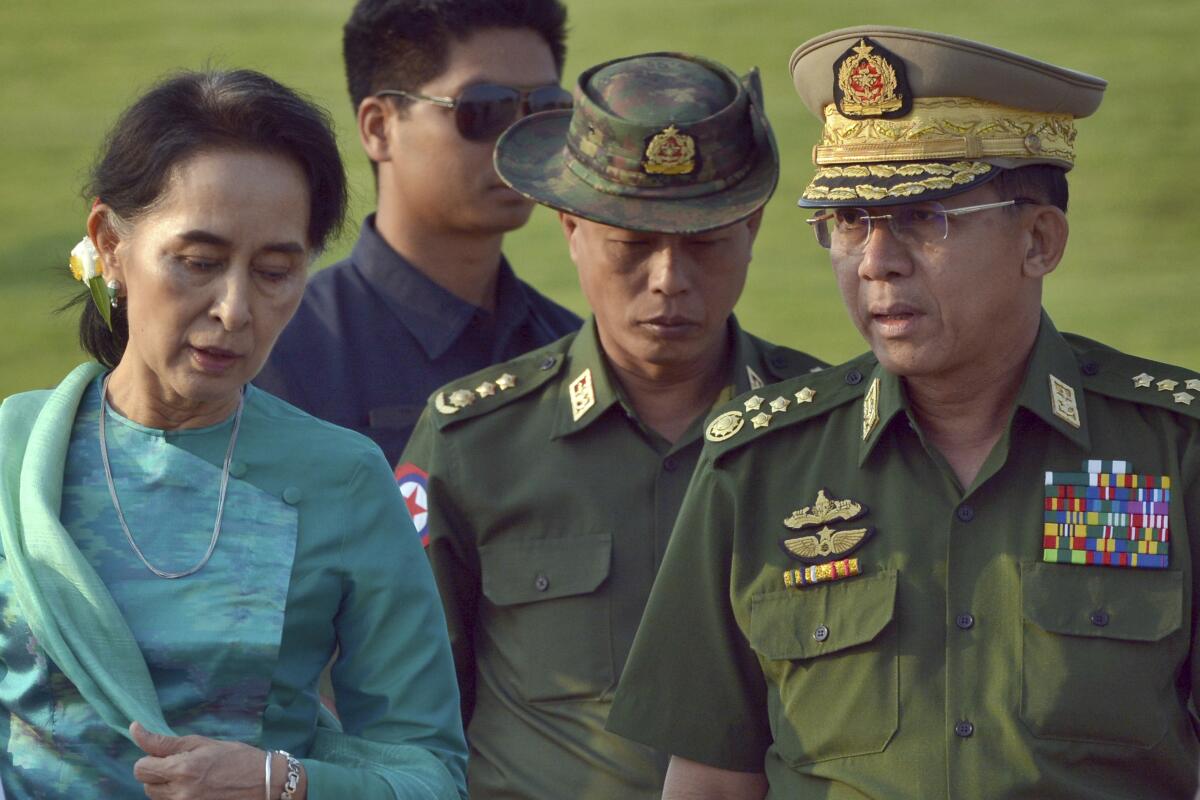The U.S. should make it clear to the Myanmar military that its power grab is the wrong way to go

- Share via
The Myanmar military’s seizure of power and overthrow of the country’s fragile quasi-democracy should be met with a swift, definitive and coordinated response from the U.S. and its allies. President Biden denounced the coup Monday as an “assault on the country’s transition to democracy” and called for the Myanmar military — which was already sharing governmental control with civilians — to give up, immediately, the power it seized and release the civilian officials detained. Those include Aung San Suu Kyi, the de facto leader of Myanmar and Nobel Peace Prize-winning champion of democracy.
If the military does not reverse course, Biden needs to reimpose at least some of the economic sanctions that Myanmar (also known as Burma) was under when it was last run by generals. The U.S. removed many of those sanctions in recognition of Myanmar’s remarkable transition to democracy over the past decade. But this latest act by the military is a grim backslide into a dictatorship that the U.S. and its allies need to make clear is intolerable.
The Myanmar senior military general-turned-autocrat, Min Aung Hlaing, and three other military leaders were already under U.S. economic sanctions for their roles in the brutal campaign of violence against the Rohingya Muslim minority in 2016 and 2017. United Nations investigators have called that genocide. The sanctions prevent those individuals from banking in the U.S. or making transactions in U.S. dollars.
Now, the U.S. and its allies should impose more sweeping economic sanctions against the military itself and its leadership. In Myanmar, military leaders largely control conglomerates that own oil and gas enterprises, restaurants, banks, manufacturing companies and jade, ruby and sapphire mines, among other businesses. The U.S. can prohibit American companies — and foreign companies subject to U.S. jurisdiction — from dealing with those Myanmar businesses or with designated military individuals.
The cause of democracy in Myanmar enjoys wide bipartisan support in Congress. When that cause is under siege, as it is now, Biden should be able to muster support from both parties for an aggressive pushback against the Myanmar military. And U.S. officials shouldn’t stop there — they should also get our major trading partners to join in the sanctions and magnify the pressure on the coup leaders.
It’s not just the development of a democratic government at stake here. As bad as the plight of the Rohingya Muslims has been under Suu Kyi — who did almost nothing to protect them from oppression — it may only get worse under a military government that believes it answers to no one.
More to Read
A cure for the common opinion
Get thought-provoking perspectives with our weekly newsletter.
You may occasionally receive promotional content from the Los Angeles Times.









